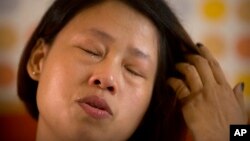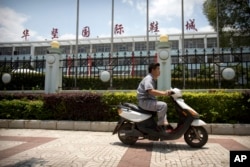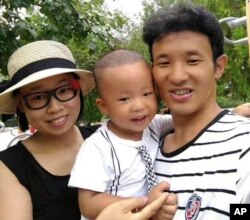When the police called, Deng Guilian was at an indoor playground watching her 3-year-old. It was 2:19 p.m., Tuesday, May 30.
The man on the phone said her husband had been picked up on suspicion of making illegal recordings and taking illegal photographs. He told her she didn't need to know the details, he just needed her address so he could send a formal notification.
“Could you please say that again?” Deng asked.
Her husband, Hua Haifeng, was a thousand kilometers (620 miles) away from her, in Ganzhou, a city in southeastern China where he had been investigating working conditions at factories that until at least March made shoes for Ivanka Trump's brand. He and his colleagues at China Labor Watch, a New York nonprofit, were preparing to publish a report alleging low pay, excessive overtime, crude verbal abuse and possible misuse of student labor at Huajian Group factories. The company denies the allegations.
Deng grew furious at the man on the phone.
“I have to take care of old people and children. All the money comes from him,” she spat. “You tell me what I should do.”
There was a pause. “I don't know,” the voice answered.
She hung up without giving her address.
Deng, 36, had entered the swelling ranks of relatives swept up in Beijing's crackdown on human rights lawyers and labor activists. Hundreds have been detained, leaving many of their extended families with no source of income.
Beyond financial suffering, the Chinese government wields great power over the lives of its citizens, which it can use to make things better - or infinitely worse - for those left behind. Wives, husbands, children and grandparents are left to look on solemnly as their lives are systematically dismembered until all that remains are the bones of fear: How will I feed my children? Will we keep our house? When will we see each other again?
Deng was terrified. Standing at the playground, watching children trying to catch goldfish, she felt like she might fall down. She didn't know whom to talk to. Her husband's ailing parents didn't know what kind of work Hua did. They just knew he made money for everybody.
Above all, she had to protect her children, from sadness and fear and whatever else lay ahead. She would tell them lies and buy them chocolate late at night when they cried for a father they weren't supposed to know was missing. It would be days before Deng herself could eat.
"Papa was taken away by a monster"
Rewind. Back to when idealism didn't seem to cost so much.
Deng met her husband in 2006 on an online chat group for people from Nanzhang county, where they are both from. A petite woman with a quick, wide smile, Deng liked Hua because he made her laugh. Deng began working in factories after high school, helping to churn out clothes, toys and electronics across Guangdong province, the heartland of China's manufacturing boom. She sat in on information sessions Hua organized to help workers learn their legal rights, and fell in love with both the man - even though she thought he was kind of short - and his ideas.
She wore a white Western gown when they married in 2010. It was a simple ceremony, at home, with no rings or fancy jewelry. She believed they were on the right side of things, working to make society better for everyone, not just the rich and the lucky.
Hua's latest investigation had taken him inside the Huajian Group, which has pumped out millions of pairs of shoes a year for brands including Ivanka Trump's from factories in China and Ethiopia. In May, Hua went undercover as a worker at one of their factories in Dongguan.
When he tried to travel to Hong Kong, he was blocked and taken out for lunch by the police, who warned him to stop the investigation. China Labor Watch, which has been exposing labor abuses for 17 years, says authorities had never made such a move before.
Hua kept working, turning his attention to Huajian's factory in Ganzhou, along with his colleagues Li Zhao and Su Heng.
Right up until Sunday afternoon, Deng and Hua chatted and exchanged photos by phone: Their 7-year-old daughter, Chen Chen, in a new dress, their son, Bo Bo, in mirrored sunglasses that made him look like a little bug.
Then Hua went silent.
“You disappeared?” Deng texted Monday afternoon, hoping to convince herself it was nothing.
That night, Bo Bo inexplicably burst into tears. “Papa was taken away by a monster,” the boy said. He told his mother he wanted a weapon so he could transform himself into the superhero Ultraman and fight the monster.
“You do not have a weapon to transform yourself,” Deng told her child. “And you are not Ultraman.”
But the boy insisted he would find a magical weapon and save his dad with his great new power.
"Each one was like a wolf"
Deng got the call about her husband two days after he disappeared. She soon began to regret decisions made long ago, like leaving work to take care of the family. It was what her husband had wanted, but now seemed stupid, isolating. She had only 400 yuan ($59) in cash. She didn't dare use the family credit card because Hua paid that bill, and how would he pay from jail?
“I feel so embarrassed that I do not have money,” Deng said. “Look at me now. I am just a housewife.”
She took loans from family members to pay the bills. The days were anxious. The nights worse. She went to bed with her phone clutched in her hand.
Her husband's disappearance had thrust Deng roughly back into society. She scrambled to learn about lawyers and fielded so many calls from foreign journalists she didn't have time to brush her teeth.
“I was a blank sheet of paper before,” she said. “Now I have no choice, I have to get to know this circle. It is hard.”
She said she never wanted to get involved with the police or the Chinese government or, most unimaginable of all, the president of the United States and his daughter.
Ivanka Trump has not commented on the arrests. Deng wishes she would, and believes she could help. “As a wife and mother of two children, I ask Ivanka Trump to release my husband,” she said.
Deng struggled to help her husband while caring for her children. Her 3-year-old grabbed peaches from the kitchen and fed himself, but he was still hungry. She sent him and his sister off to their aunt's house for two days, without explaining why. The children kept calling to say they missed her cooking and their toys.
Three days after the first phone call, police began searching for Deng. They knocked on the doors of family members in town, who Deng had been trying to hide the terrible news from, humiliating her in front of her neighbors.
“People here may think as long as someone is being taken away, this person must be evil,” she said. They eventually tracked her down at her mother's house and drove her to the station around 9 p.m. that Friday night.
Four men took her into a small room and pulled their chairs in a tight circle around her.
“Each one was like a wolf,” she said.
One man stared at her. Another wrote down everything she said. A third examined her phone, scrolling through her exchanges with foreign journalists. “You don't know these people but you told them how old your children are and where you live,” a fourth man said. “Do you think that's safe?”
It was after midnight when they let her go.
“'Do not let your husband's crime turn into something like leaking state secrets,”' Deng said she was told. “They spoke so seriously. Anyway, I don't understand, but it was just terrifying.”
The following afternoon, the post office called to say they had a letter for her. She raced over on her bicycle and tore the envelope open with a knife at home. As expected, it was the official police notice of her husband's arrest.
She finally knew for sure what had happened to Hua.
For the first time in nearly a week, Deng was hungry. She sat down to a bowl of her mother's steaming rice porridge and fried green vegetables.
The police called again and came by to take her to the village committee office. The Communist Party secretary of the village, a local official and a policeman began asking about her family. They took photographs of her text message exchanges with The Associated Press. They told her Hua was in serious trouble and advised her to make smart decisions.
They offered to help her financially, and to provide good health care to her mother, who suffers from serious diabetes. They said her home would finally get the running water her family had long sought, which would mean Deng could stop hauling well water upstairs in buckets.
The more these men talked, the more she grieved, until she burst. The men watched as she cried - for her sick mother, her children, her isolation, her sudden poverty, her lost husband.
She went home calm and determined.
What she had to do was simple: Her husband needed clothing and food. She would deliver them.
“I will not be afraid,” she said, using a Chinese expression, “I dare to climb a mountain of swords or plunge into a sea of flames.”
Buying underwear for other people's husbands
Deng packed a single black backpack and the next morning boarded a standing-room-only train with her son and sister-in-law for the 12-hour journey to Ganzhou, where her husband and his two colleagues were being held on allegations of using secret recording devices to disrupt Huajian's business. It was folly making a 3-year-old stand up through the night, but she figured they could camp out in the canteen car and pick on fried cucumber with pork while the child slept. His sister stayed with Hua's parents.
Eight days after Hua's disappearance, Deng arrived in Ganzhou, a relatively poor Chinese city better known for oranges than factories that sits astride a lazy brown river in southeastern China's Jiangxi province. One of its biggest corporate players is Huajian, the company that Hua, Li and Su had been investigating.
The shoe factory where the alleged labor violations occurred sits in a growing complex of Huajian buildings, all painted the same pale blue, including rows of Huajian apartment towers, a Huajian innovation park, a Huajian school and a Huajian swimming pool.
The first thing Deng did when she arrived was install her son and sister-in-law in a small hotel room with cheery yellow walls. Then she hired a lawyer. Then she went shopping.
She figured Hua's colleagues could also use a few things, but she agonized over what sizes to buy for the men. Li Zhao was so big she worried even XL wouldn't fit. Su Heng she'd never set eyes on. Medium seemed like a safe bet.
“I've never bought underwear for other people's husbands,” Deng said, laughing.
Two hours later, she stumbled out in her high wedge sandals, tripping under the weight of three pairs of slippers, six pairs of shorts, six T-shirts, three towels and nine pairs of underwear. It cost 450 yuan ($66), nearly half of her rainy day fund.
She brought everything back to the detention center. She didn't know the center's rules and came at the wrong time, and she didn't know she had to label everything. Worse, they forbade rope and made her pull the string out of the waistband of all the men's shorts. She worried they would all fall down. She put money on meal cards for the three men.
Summer rains washed across Ganzhou, leaving the air hot and heavy. There was no air conditioning at the detention center. When the lawyer Deng had hired, Wen Yu, came out, his hair was wet with sweat. He'd been waiting since 9 a.m. to meet Hua and sometime after 5 p.m. was finally permitted to see him for one minute, just long enough to introduce himself. Deng was not allowed to visit her husband and was anxious for news.
“We need to try again tomorrow,” Wen said.
Police from her hometown, Deng learned, had visited Hua in jail, urging him to write a letter telling his wife to stop talking with the foreign media. Police also threatened her brother-in-law, she said.
Wen was ordered not to speak with foreign reporters and he stopped granting interviews. On Tuesday, police visited the hotel in Ganzhou where Deng was speaking with AP journalists, sending a maid up to knock on the door, effectively cutting short the interview.
Police in Ganzhou and Jiangxi, as well as in Deng's hometown could not be reached immediately for comment.
Chinese state-run media began publishing photos of the evidence collected against her husband and his colleagues, claiming they had all confessed.
But Deng still talked. The more they tried to stop her, the more she wanted to speak.
She talked so much her mouth dried out and her voice grew raspy.
What, she wondered, was so threatening about her story?
“I have an unknown tenacity,” she said.
Lawyer hired, underwear delivered, by Wednesday it was time to go home.
“I want to stay here,” Bo Bo said. “I don't want to go home.”
“Here, I bought you snacks, chips and chicken,” Deng said. “Come on, put your shoes on.”
A 10-minute taxi ride later, Deng hoisted Bo Bo to her hip and stepped through a metal gate with her sister-in-law into the cool blue of the train station. She wiped her son's nose, gave him water and played with him on the grimy floor while they waited.
Deng hoped to rest when she got home, but expected the police would be there again for her in the morning and maybe the afternoon too, reminding her they were there, watching. She was not afraid. China is a country of laws, she believed, and as long as she didn't break them, nothing bad would happen.
Then again, there was her husband, who she believed had done nothing wrong and was at that very moment in jail, eating bad food and sleeping by a plastic bucket used as a toilet by 20 men who had been ordered not to speak to him. At least he hadn't been beaten.
At 1:12 p.m., the green train to Xiangyang city eased forward, carrying Deng and her son off to an uncertain future.







